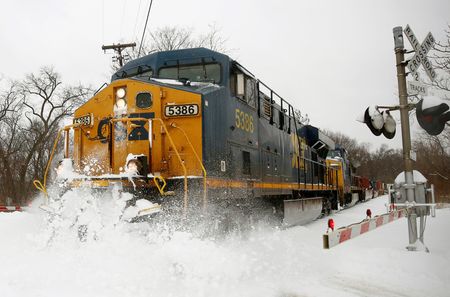By Lisa Baertlein and Rod Nickel
(Reuters) -Rail operator CSX Corp is changing its workforce attendance policy for unexpected, short-term medical absences next year after U.S. railroads’ sick-time policies became a flashpoint in national labor talks.
CSX is among the railroads that used so-called points-based attendance policies to reduce unplanned absences. Under the long-established policies, workers are penalized with points for unscheduled absences, and risk being suspended or fired.
The scheme came under fire during the pandemic, when industry-wide job cuts meant to bolster profits left fewer workers to manage the COVID-related cargo surge.
Rail unions are protesting the lack of federal intervention on sick-time policies outside the U.S. Capitol and in cities around the country on Tuesday.
On Dec. 2, U.S. President Joe Biden signed legislation that broke the impasse that could have halted shipments of food, fuel and medicine, stranded commuters and harmed the U.S. economy without making any changes to sick-time agreements.
When the pandemic struck and freight volumes surged, affected rail workers said those policies discouraged them from seeking medical care or taking time off to recover from illness.
Under the new policy effective Jan. 1, CSX said on Tuesday it will no longer assess points when an employee calls in sick shortly before a scheduled workday with an illness for which they saw a doctor.
CSX’s new attendance rules will be “non-disciplinary and non-punitive,” the company said in an email to Reuters.
Four of 12 unions involved in the latest railroad contract talks rejected a recently negotiated deal because it did not include any paid short-term sick days and failed to address the attendance points system used by CSX and the two largest U.S. railroads: Union Pacific and Berkshire Hathaway-owned BNSF.
Under the new CSX policy, accrued points will expire on a rolling 12-month cycle rather than accumulate indefinitely, and employees will receive credit for working without an absence and can use those to expunge points. CSX said it does not apply points when employees miss work due to hospitalization or emergency treatment.
Clark Ballew, a former CSX track worker and communications director for the Brotherhood of Maintenance of Way Employees Division (BMWED) rail union, said the changes are a step in the right direction, but fall short of repairing damage from industry cost-cutting.
Union Pacific told Reuters it expects to start working with unions on quality of life issues in the coming weeks. BNSF did not immediately respond to questions regarding its policy on health-related absences.
On Friday, more than 70 lawmakers urged Biden to take executive action to guarantee rail workers paid sick days.
Meanwhile, Canada on Dec. 1 granted workers at railroads and other regulated workplaces at least 10 days of paid sick leave annually. Canada’s two biggest freight railways, Canadian National Railway Co and Canadian Pacific Railway Ltd, have about 10,000 employees in the United States. Collective bargaining with U.S. workers will determine sick-day requirements, the railways said.
(Reporting by Lisa Baertlein in Los Angeles and Rod Nickel in Winnipeg;Editing by Tomasz Janowski, Matthew Lewis and Kim Coghill)

